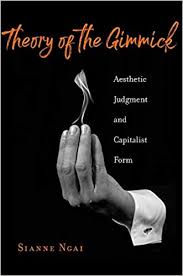Merve Emre at The New Yorker:
 Although Ngai’s books are conceptually and philosophically dense, their appeal comes from how they tap into our ordinary use of language. Unless I collect art, or live in a many-windowed house at the edge of a westerly peninsula, where the sea is gilded by the sun and silvered by the moon, I am unlikely to have regular encounters with things I would call “beautiful” or “sublime,” and I may well find the rush and roar of such Romantic descriptions embarrassing. But not a day goes by when I do not call something—my son’s stuffed animals, a dress, a poem by Gertrude Stein—“cute,” or a novel or an essay “interesting.” And I can’t count the number of times I’ve called a kitchen gizmo my husband swears we really, really need (but we really, really don’t) or a colleague’s online persona “gimmicky.” “Theory of the Gimmick” finds in the pervasiveness of the gimmick the same duelling forces of aesthetic attraction and repulsion that shape all Ngai’s work. “ ‘You want me,’ the gimmick outrageously says,” she writes. “It is never entirely wrong.”
Although Ngai’s books are conceptually and philosophically dense, their appeal comes from how they tap into our ordinary use of language. Unless I collect art, or live in a many-windowed house at the edge of a westerly peninsula, where the sea is gilded by the sun and silvered by the moon, I am unlikely to have regular encounters with things I would call “beautiful” or “sublime,” and I may well find the rush and roar of such Romantic descriptions embarrassing. But not a day goes by when I do not call something—my son’s stuffed animals, a dress, a poem by Gertrude Stein—“cute,” or a novel or an essay “interesting.” And I can’t count the number of times I’ve called a kitchen gizmo my husband swears we really, really need (but we really, really don’t) or a colleague’s online persona “gimmicky.” “Theory of the Gimmick” finds in the pervasiveness of the gimmick the same duelling forces of aesthetic attraction and repulsion that shape all Ngai’s work. “ ‘You want me,’ the gimmick outrageously says,” she writes. “It is never entirely wrong.”
more here.
